Rubin at peace with Meerkat's 5 minutes of SXSW fame
Add Axios as your preferred source to
see more of our stories on Google.

Ben Rubin. Photo: Houseparty
Three years after his live video app Meerkat was all the rage at SXSW festival, Life on Air co-founder and CEO Ben Rubin can deal with its short-lived success (they later pivoted to Houseparty app). It was simply one of his company’s many steps in figuring out how to help people connect with each other and be present, he tells Axios.
Why it matters: While chatting with Axios at SXSW this weekend, Rubin discusses the current state of the social media market and problems facing companies. Many have been criticized for exploiting human psychology and having harmful effects on people’s mental health, something Facebook has begun to admit recently.
On abuse via social media companies like Facebook and Twitter:
I don't think that anybody did something bad. I think that if I were them, I'd probably be in the same place… Every product person is very optimistic, very naive, and that's how good product people should be. And because of this, we forget that in the real world, people will exploit this thing.
On the success of Houseparty, his company's new video chat app:
How many times in order of magnitude do you think Houseparty is bigger than Meerkat? …27 times bigger [in terms of daily usage] than our best day on Meerkat.
On life after Meerkat’s initial success and its quick decline after Twitter released a rival:
It was very lonely time for like six months… And we had to focus, and we decided that we're going to pivot and we made the decision literally three months after we launched Meerkat… And the beautiful thing about Houseparty is that the moment we had that [minimum viable product]… we’re like 'this is what we're trying to build, this is what we're missing.'
On the lessons from Meerkat and building Houseparty:
We realized like real people don't really like to broadcast, and that's fine. So how can we find that mental model of moving from the stage metaphor, which is that one-to-many broadcast, to a ‘house party’ metaphor, which is people who know each other and how they interact.
On the rise of smartphones and social media:
2011 was such an incredible year. Why? Smartphones are crossing like 50% penetration in the States. Social networks become ubiquitous and people are starting to exist online and see their identity online…And the interesting thing is that for age groups of 21 and 24 and below since 2011… they’re hanging with friends in real life 40% less than the same age group…And they get less into car accidents. They’re less likely to explore, you know sexually, their life. They’re less likely to try to smoke cigarette like there's all these things that are not happening.
But also what happened is that in the same age group, teen depression has tripled… For female teens, depression has gone to like 48%— 48% of females below the age of 21 experienced depression, like real depression…It’s like nuts, and that number is three times higher than it was before 2011.
On the toxicity of social media feeds:
The way you can make money off feeds and the way you make feeds more addictive, there's only two levers. Either I show you things that reaffirm you, that make you feel good about yourself that makes the insecurity about yourself—or things that you aspire to be... What's wrong about it is that it removes the diversity of opinion, it removes the conversation, and then it removes in the end empathy because you don't really expose the different opinion.
On why even sending messages ins't the same as social interaction:
I don't want to live in a world where my kids, like, have the best emojis for a conversation, but don't have like the best facial expression because they just don't know what to do.
On his background in architecture and building social apps:
I'm not in the business of social media... I studied architecture for three years before I left to do this and what I tried to do in architecture is to create new encounters between people.
